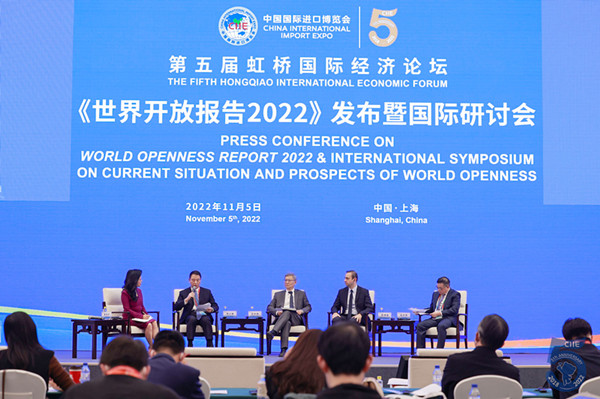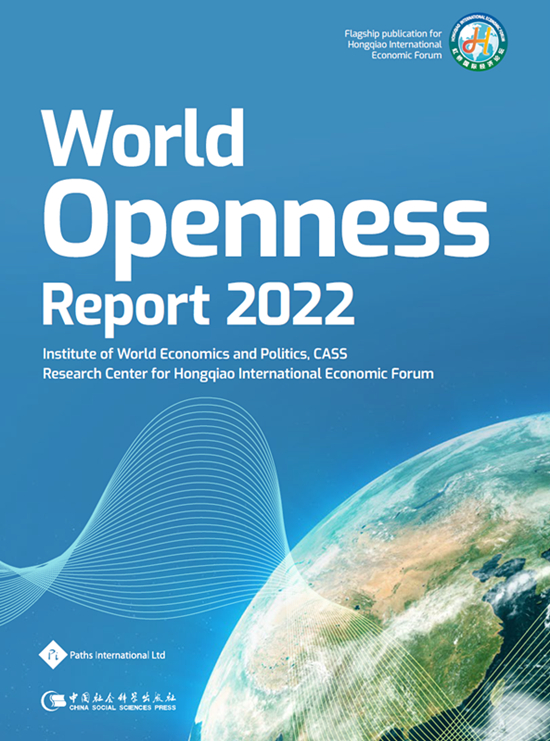Report: China is opening up more to the world
- By Zhang Rui
 0 Comment(s)
0 Comment(s) Print
Print E-mail China.org.cn, November 7, 2022
E-mail China.org.cn, November 7, 2022

The World Openness Report 2022 was released at a session of the Hongqiao International Economic Forum during the ongoing China International Import Expo (CIIE). The document showed that China is more open to the world in contrast with some developed economies.
According to the report reviewing the openness levels of 129 economies from 2008 to 2020, China's openness index jumped from 0.7107 in 2012 to 0.7507 in 2020, up 5.6%, and its ranking rose eight places from 47th to 39th.
"China has become the driving force of world economic growth," Wang Shouwen, vice minister of commerce and China international trade representative at the Ministry of Commerce, said via video link, listing China's achievements and contributions to the world's economy and openness.
Last year, China's total trade in goods and services reached $6.9 trillion, ranking first in the world for two consecutive years. China has become a major trading partner of more than 140 countries and regions. Over the past 10 years, China's average annual contribution to world import growth has exceeded 20%, and its average annual contribution to global economic growth has been about 30%. China's overall tariff level has dropped to 7.4%, which is close to the level of developed WTO members. A total of 21 pilot free trade zones were established in China from 2013 to 2021, while during the same period, China's trade in goods with countries along the Belt and Road totaled nearly $11 trillion, and its direct investment in those countries totaled $164 billion.
The report looking back at the 2020 world economy was compiled by the Institute of World Economics and Politics under the Chinese Academy of Social Sciences and the Research Center for the Hongqiao International Economic Forum. The previous edition was published in 2021 during that year's CIIE. It is the first report to examine the openness of world economies after the COVID-19 outbreak.
Overall, the index continued to show a downward trend in 2020. That year, the World Openness Index was at 0.7491, down 0.02% from 2019, mainly due to the increase in cross-border social isolation because of the pandemic. But Zhang Yuyan, head of the Institute of World Economics and Politics and one of the index's compilers, said the world's openness has withstood the great test of the pandemic, and has not retrogressed significantly. "It shows that the world's openness has strong resilience," he said.
Zhang noted the resilience comes not only directly from the countervailing expansion of economic and cultural opening to offset the narrowing of social opening, but also from the strong internal demand of humanity to overcome difficulties under the heavy pressure of the pandemic. However, the COVID-19 restrictions and control measures led to sharp declines in the total numbers of cross-border tourists, international students and immigrants, meaning that the world social openness index fell 7.2% in 2020 compared with 2019, the largest decline since data was made available in 2008.

He pointed out that the decline of the world's openness in the medium term is alarming: From 2008 to 2020, the index dropped by 4.1%, with the openness index of developed economies decreasing by 5.9%, while that of developing economies increased by 4.4%. For example, the United States, which was the most open economy in 2008, slid to 23rd place. Meanwhile, BRICS countries and economies along the Belt and Road have opened wider: In 2020, the openness index of Belt and Road economies was at 0.7218, up 0.4% from 2019, and the BRICS openness index rose 0.2% to 0.7091 in 2020.
"In recent years, a few developed countries have first pursued unilateralism, protectionism and hegemonism, given priority to themselves and decoupled the industry chains among countries," Zhang added. "Then came COVID-19, anti-globalization sentiment and geopolitical crises, which made international economic, social and cultural exchanges increasingly difficult. Human society is standing at a crossroads, facing unprecedented challenges and critical choices."
But he noted more driving forces for world openness are emerging, which include progress in global governance like the achievements of the World Trade Organization's 12th Ministerial Conference and the implementation of the Regional Comprehensive Economic Partnership (RCEP). Also, digital finance is a highlight of financial openness while digital and green economies are new additions to the world's openness.
"Openness promotes economic development; open economies can specialize and trade with each other," said Christopher Pissarides, a professor of economics at the London School of Economics and Political Science and the 2010 Nobel laureate in Economic Sciences, via video link. "Openness is an economic objective that policymakers and businesspeople want to be informed about. The World Openness Report is a valuable tool to advance this aim."
He noted that as the report calculates a World Openness Index for many countries, the addition of social and cultural factors in considering the construction of the World Openness Index is welcome. "Good relations encourage better economic exchange too," he said. "Understanding each other's cultures and social conventions is a prerequisite to peaceful coexistence; exchange of goods and ideas opens horizons that cannot be unlocked by single isolated countries."
Pissarides added: "Geopolitical tensions and disagreements about the role of international organizations, such as the World Trade Organization, create uncertainty about the future; and uncertainty is a deterrent of investment in activities that involve collaborations with foreign countries. Unfortunately, this uncertainty is also a barrier to enjoying the benefits of more interaction with the rest of the world. Nations need to realize this truth and maintain their efforts to iron out their disagreements about economic openness."
After the press conference on the World Openness Report 2022, the International Symposium on the Current Situation and Prospects of World Openness was held, where senior government officials and top economists, including Zhou Xiaochuan, former governor of the People's Bank of China; Justin Yifu Lin, dean of the Institute of New Structural Economics at Peking University; and Yi Xiaozhun, the WTO's former deputy director-general, further discussed the report and world's prospects.






Go to Forum >>0 Comment(s)